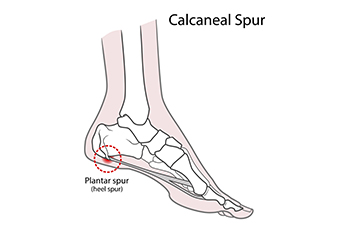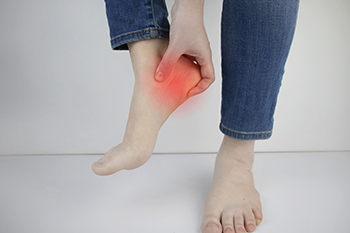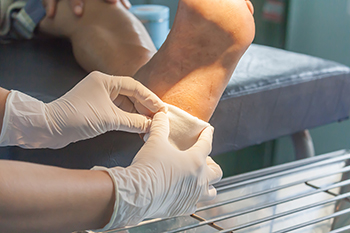Garner (919) 661-4150
October 2023
An Overview of Heel Spurs

A heel spur is a common foot condition that is often discussed in the context of heel pain and discomfort. Despite their reputation, they are not actually sharp, pointy growths, as the term may imply. Instead, heel spurs are calcium deposits that form on the underside of the heel bone. These deposits often develop over an extended period of time due to chronic inflammation or stress on the plantar fascia, the band of tissue that connects the heel to the toes. The primary characteristic of heel spurs is the accompanying pain. This discomfort is often described as a sharp, stabbing sensation, particularly with the first steps in the morning or after prolonged periods of rest. It is important to note that not everyone with heel spurs experiences pain, as many people have them without any symptoms. The causes of heel spurs are diverse, with factors such as obesity, gait abnormalities, or wearing inadequate footwear contributing significantly. Heel spurs are a condition that is often linked to heel pain, but they are generally not the sole cause. If you are experiencing persistent heel pain, it is suggested that you consult a podiatrist, who can accurately diagnose and treat heel spurs if they are the culprit.
Heel spurs can be incredibly painful and sometimes may make you unable to participate in physical activities. To get medical care for your heel spurs, contact Chukwuma Ukata, DPM from Advanced Carolina Foot and Ankle Center. Our doctor will do everything possible to treat your condition.
Heels Spurs
Heel spurs are formed by calcium deposits on the back of the foot where the heel is. This can also be caused by small fragments of bone breaking off one section of the foot, attaching onto the back of the foot. Heel spurs can also be bone growth on the back of the foot and may grow in the direction of the arch of the foot.
Older individuals usually suffer from heel spurs and pain sometimes intensifies with age. One of the main condition's spurs are related to is plantar fasciitis.
Pain
The pain associated with spurs is often because of weight placed on the feet. When someone is walking, their entire weight is concentrated on the feet. Bone spurs then have the tendency to affect other bones and tissues around the foot. As the pain continues, the feet will become tender and sensitive over time.
Treatments
There are many ways to treat heel spurs. If one is suffering from heel spurs in conjunction with pain, there are several methods for healing. Medication, surgery, and herbal care are some options.
If you have any questions feel free to contact our office located in Garner, NC . We offer the latest in diagnostic and treatment technology to meet your needs.
Is Your Heel Pain From Plantar Fasciitis?

Determining the root cause of heel pain can be challenging, especially when other conditions like arthritis or tarsal tunnel syndrome come into play. Plantar fasciitis is a leading culprit behind heel pain. It is characterized by sharp pain, inflammation, and tenderness in the sole of the foot, particularly near the heel. Notably, the pain is most pronounced during the first few steps in the morning or after prolonged periods of sitting. Unlike osteoarthritis, which tends to worsen with movement, plantar fasciitis pain often improves as you walk around but worsens later in the day. The condition arises when the plantar fascia, the ligament connecting the heel to the ball of the foot, loses its elasticity and develops tiny tears. These tears lead to painful swelling in the ligament. Diagnosis by a podiatrist may involve a thorough medical history, a physical examination, including range-of-motion tests, and sometimes an X-ray. The good news is that most people with plantar fasciitis find relief through non-invasive, non-surgical treatments. If you suspect you may have developed plantar fasciitis, it is suggested that you make an appointment with a podiatrist for an exam, a diagnosis, and suggested treatment options.
Plantar fasciitis can be very painful and inconvenient. If you are experiencing heel pain or symptoms of plantar fasciitis, contact Chukwuma Ukata, DPM from Advanced Carolina Foot and Ankle Center. Our doctor can provide the care you need to keep you pain-free and on your feet.
What Is Plantar Fasciitis?
Plantar fasciitis is the inflammation of the thick band of tissue that runs along the bottom of your foot, known as the plantar fascia, and causes mild to severe heel pain.
What Causes Plantar Fasciitis?
- Excessive running
- Non-supportive shoes
- Overpronation
- Repeated stretching and tearing of the plantar fascia
How Can It Be Treated?
- Conservative measures – anti-inflammatories, ice packs, stretching exercises, physical therapy, orthotic devices
- Shockwave therapy – sound waves are sent to the affected area to facilitate healing and are usually used for chronic cases of plantar fasciitis
- Surgery – usually only used as a last resort when all else fails. The plantar fascia can be surgically detached from the heel
While very treatable, plantar fasciitis is definitely not something that should be ignored. Especially in severe cases, speaking to your doctor right away is highly recommended to avoid complications and severe heel pain. Your podiatrist can work with you to provide the appropriate treatment options tailored to your condition.
If you have any questions please feel free to contact our office located in Garner, NC . We offer the newest diagnostic and treatment technologies for all your foot and ankle needs.
Healthy Feet Can Begin With Everyday Foot Care

Having smooth, healthy feet is not just about aesthetics, it is essential for overall comfort and well-being. Fortunately, achieving this goal does not require fancy treatments or expensive products. Consistent everyday foot care can make a significant difference. Start with regularly washing and drying your feet daily, using mild soap and warm water. Make sure to dry them thoroughly, especially between the toes, to prevent moisture-related issues such as athlete's foot. Moisturizing the feet is important in keeping the feet smooth. Appling a good quality foot cream or lotion can help to keep your skin hydrated, preventing dryness and cracking. Pay extra attention to the heels, where dry skin is most common. Trim your toenails straight across to prevent ingrown nails, and wear well-fitting shoes that have adequate support. Rotate your shoe choices to avoid putting excessive pressure on one area of your feet. Lastly, incorporate foot exercises into your routine to improve flexibility and circulation. A simple toe wiggling or calf stretching routine can work wonders. With these everyday foot care habits, you can maintain smooth, healthy feet that feel comfortable and look great. If you would like more information about everyday foot care tips, it is suggested that you contact a podiatrist.
Everyday foot care is very important to prevent infection and other foot ailments. If you need your feet checked, contact Chukwuma Ukata, DPM from Advanced Carolina Foot and Ankle Center. Our doctor can provide the care you need to keep you pain-free and on your feet.
Everyday Foot Care
Often, people take care of their bodies, face and hair more so than they do for their feet. But the feet are a very important aspect of our bodies, and one that we should pay more attention to. Without our feet, we would not be able to perform most daily tasks.
It is best to check your feet regularly to make sure there are no new bruises or cuts that you may not have noticed before. For dry feet, moisturizer can easily be a remedy and can be applied as often as necessary to the affected areas. Wearing shoes that fit well can also help you maintain good foot health, as well as making it easier to walk and do daily activities without the stress or pain of ill-fitting shoes, high heels, or even flip flops. Wearing clean socks with closed shoes is important to ensure that sweat and bacteria do not accumulate within the shoe. Clean socks help to prevent Athlete’s foot, fungi problems, bad odors, and can absorb sweat.
If you have any questions please feel free to contact our office located in Garner, NC . We offer the newest diagnostic and treatment technologies for all your foot and ankle needs.
Are You Suffering From Ingrown Toenails?
Alternative Therapies for Non-Healing Diabetic Foot Ulcers

Maggot therapy, also known as Maggot Debridement Therapy, MDT, or Larval therapy, has a long history in medicine and has gained recent recognition for its unique ability to save limbs. This biotherapy involves placing disinfected maggots, often the larvae of the greenbottle blowfly, on wounds, such as diabetic foot ulcers, to debride necrotic tissues. It is particularly effective when antibiotics fail to combat bacterial infections in non-healing wounds, potentially preventing limb amputations. Maggots work by secreting special enzymes, which break down necrotic tissue, making it easier to digest and absorb. They also produce antibiotic-like agents and release ammonia to inhibit bacterial growth in the wound. Administration involves placing sterile maggots within a dressing on the wound for 48 to 72 hours. This therapy has broad applications, including diabetic ulcers, vascular ulcers, pressure ulcers, and even malignant wounds. Studies have shown that maggot therapy accelerates wound healing, reduces necrotic tissue, and decreases wound odor. While this therapy is highly effective, it should not be used for wounds near vital organs or blood vessels and in septic patients. Additional research can further expand the applications of this therapy, however, it saves 40 to 50 percent of limbs when used as a last resort. If you have a non-healing diabetic foot wound and would like alternative treatments for healing, it is suggested that you make an appointment with a podiatrist to discuss this further.
Wound care is an important part in dealing with diabetes. If you have diabetes and a foot wound or would like more information about wound care for diabetics, consult with Chukwuma Ukata, DPM from Advanced Carolina Foot and Ankle Center. Our doctor will assess your condition and provide you with quality foot and ankle treatment.
What Is Wound Care?
Wound care is the practice of taking proper care of a wound. This can range from the smallest to the largest of wounds. While everyone can benefit from proper wound care, it is much more important for diabetics. Diabetics often suffer from poor blood circulation which causes wounds to heal much slower than they would in a non-diabetic.
What Is the Importance of Wound Care?
While it may not seem apparent with small ulcers on the foot, for diabetics, any size ulcer can become infected. Diabetics often also suffer from neuropathy, or nerve loss. This means they might not even feel when they have an ulcer on their foot. If the wound becomes severely infected, amputation may be necessary. Therefore, it is of the upmost importance to properly care for any and all foot wounds.
How to Care for Wounds
The best way to care for foot wounds is to prevent them. For diabetics, this means daily inspections of the feet for any signs of abnormalities or ulcers. It is also recommended to see a podiatrist several times a year for a foot inspection. If you do have an ulcer, run the wound under water to clear dirt from the wound; then apply antibiotic ointment to the wound and cover with a bandage. Bandages should be changed daily and keeping pressure off the wound is smart. It is advised to see a podiatrist, who can keep an eye on it.
If you have any questions, please feel free to contact our office located in Garner, NC . We offer the newest diagnostic and treatment technologies for all your foot care needs.
Compelling Reasons to Pursue Podiatry

Studying podiatry is a unique and rewarding journey that offers several compelling reasons to consider. Podiatrists play a vital role in healthcare by specializing in the diagnosis, treatment, and prevention of conditions related to the foot, ankle, and lower extremities. This specialization addresses a significant and often underestimated aspect of overall health. Additionally, podiatry offers diverse career opportunities. Graduates can work in various settings, including private practices, hospitals, sports medicine clinics, and research institutions. The ability to choose from different specialties within podiatry, such as sports medicine, surgery, or geriatrics, adds to the versatility of the field. Furthermore, the demand for podiatrists continues to grow as the population ages and becomes increasingly aware of the importance of foot health. Podiatry offers a stable and potentially lucrative career path. Ultimately, studying podiatry provides the chance to make a tangible difference in people's lives by improving their mobility, relieving pain, and enhancing their overall well-being. It is a profession that combines medical expertise with patient care, making it a fulfilling and impactful choice for those interested in healthcare. If you are interested in pursuing a career in podiatry, it is suggested that you discuss any questions or concerns with this type of doctor who can help you make an informed decision.
If you are dealing with pain in your feet and ankles, you may want to seek help from a podiatrist. Feel free to contact Chukwuma Ukata, DPM from Advanced Carolina Foot and Ankle Center. Our doctor can provide the care you need to keep you pain-free and on your feet.
What Is a Podiatrist?
A podiatrist is a doctor of podiatric medicine who diagnoses and treats conditions of the foot, ankle, and related structures of the leg. Your podiatrist may specialize in a certain field such as sports medicine, wound care, pediatrics, and diabetic care. Podiatrists have the ability to become board certified through training, clinical experience, and then taking an exam.
What Do Podiatrists Do?
On a daily basis, a podiatrist may perform the following activities:
- Diagnose foot ailments such as ulcers, tumors, fractures, etc.
- Use innovative methods to treat conditions
- Use corrective orthotics, casts, and strappings to correct deformities
- Correct walking patterns and balance
- Provide individual consultations to patients
It is very important that you take care of your feet. It’s easy to take having healthy feet for granted, however foot problems tend to be among the most common health conditions. Podiatrists can help diagnose and treat a variety of feet related conditions, so it is crucial that you visit one if you need assistance.
If you have any questions please feel free to contact our office located in Garner, NC . We offer the newest diagnostic and treatment technologies for all your foot and ankle needs.







